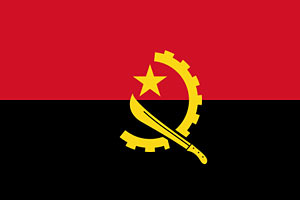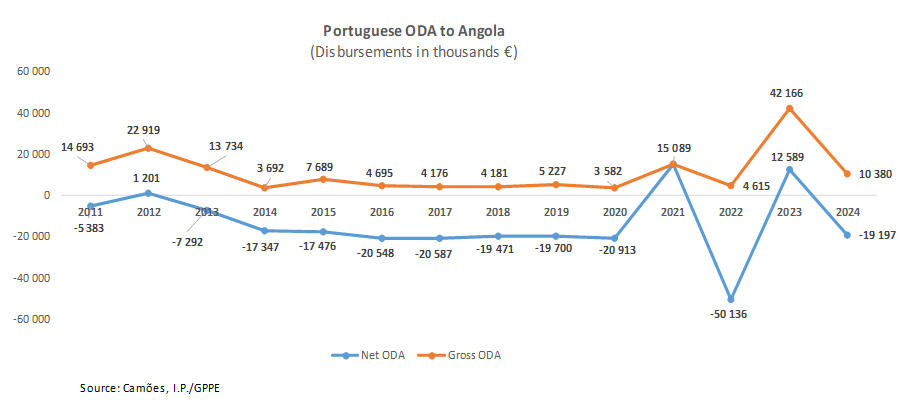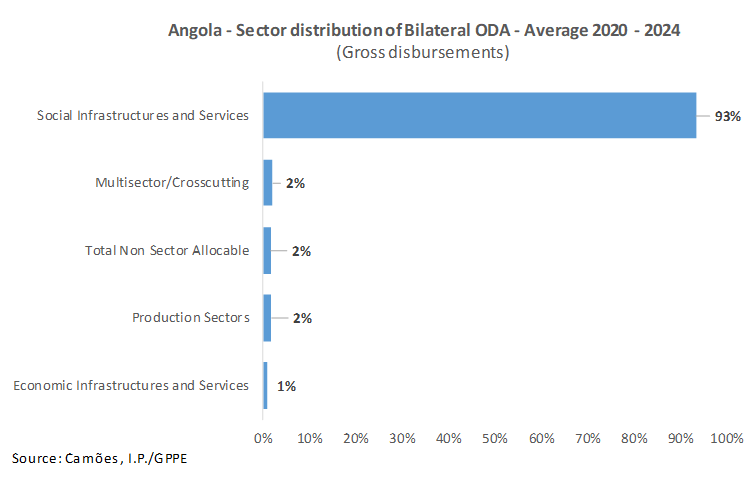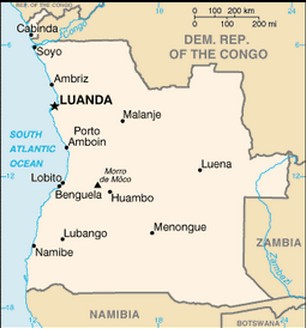Co-operation relations between Portugal and Angola
Dados gerais
 Designação Oficial: República de Angola
Designação Oficial: República de Angola
Capital: Luanda
Presidente da República: João Lourenço (desde 26 de setembro de 2017)
Vice-Presidente: Esperança da Costa (desde 15 de setembro de 2022)
Províncias: 18 - Bengo, Benguela, Bié, Cabinda, Cuando-Cubango, Cuanza-Norte, Cuanza-Sul, Cunene, Huambo, Huíla, Luanda, Lunda-Norte, Lunda-Sul, Malanje, Moxico, Namibe, Uíge e Zaire.
Línguas: Oficial - Português; Outras Línguas: Umbundu, Kikongo, Kimbundo, Chokwe, Nhaneca, Nguanguela e Kwanhama.
Religiões: Católica (41%); Protestante (38%); Outras (7,4%).
Informação Geográfica
Área: 1 246 700 Km2
Clima: Equatorial e Tropical
Informação Demográfica
População: 35,9 milhões de habitantes (2023-CIA, World Factbook, est.)
Taxa Média anual de Crescimento da População: 3,2% (2021-BM)
Densidade populacional: 27 hab/Km2 (2020-BM)
População urbana: 68,7% (2023-CIA, World Factbook, est.)
Áreas urbanas mais populosas: 9.292 milhões Luanda (capital); 959,000 Lubango, 905,000 Cabinda; 809,000 Benguela; 783,000 Malanje (2023-CIA, World Factbook, est.)
Taxa Bruta de Natalidade: 41,4% (2023-CIA, World Factbook, est.)
Taxa Bruta de Mortalidade: 7,8% (2023-CIA, World Factbook, est.)
Esperança de Vida: 62 anos (2020-BM)
Índice de Desenvolvimento Humano: 148.ª posição (2021-PNUD)
Informação Económica
Unidade Monetária: Kwanza
Total do PIB: 67,4 bilhões USD (2021-BM)
PIB Per Capita: 3.236 USD (2023-AICEP, est.)
Taxa de Inflação: 2,4% (2023-AICEP, est.)
Taxa de Crescimento: 3% (2023-AICEP, est.)
Principais Exportações: Petróleo, Diamantes, Pedras Preciosas Várias, Madeiras, Café, Peixe, Algodão, Sisal (2017- AICEP).
Exportações Portugal: 1.424 milhões de euros (2022-AICEP)
Importações Portugal: 624 milhões de euros (2022-AICEP)
Principais Investidores: China, Estados Unidos da América, Índia, Reino Unido, Brasil, Espanha e Portugal (2017-AICEP)
Outros Dados
Embaixada de Portugal em Luanda
Embaixador: Francisco Alegre Duarte (desde março de 2022)
Morada (Chancelaria): Avenida de Portugal, 50, Caixa Postal 1319, Luanda
Telefone: (+244) 222 331 079
Adido para a Cooperação e Diretor do Centro Português de Cooperação: Miguel Girão de Sousa
Diretora do Centro Cultural Português: Ana Brito Maneira, Ministra Conselheira
Telefone: (+244) 222 390 545 / (+244) 222 330 243
Site: https://luanda.embaixadaportugal.mne.gov.pt/pt/
Embaixada da República de Angola em Lisboa
Embaixadora: Maria de Jesus Ferreira (desde 2023)
Morada (Embaixada): Av. da República, n.º 68
Telefones: (+351) 210 405 170 / 217 967 041
E-mail:
Site: http://www.embaixadadeangola.pt/
Ponto de Situação

Enquadramento Geral
As relações de cooperação entre Portugal e Angola assentam numa matriz cultural, jurídica e institucional comum e de competências técnicas específicas em áreas fundamentais para o desenvolvimento. Neste sentido, a partilha de uma língua comum permite um mais fácil enquadramento da intervenção da Cooperação Portuguesa em Angola.
A cooperação institucional entre os dois Estados tem evoluído de forma dinâmica ao longo dos anos, vindo a desenvolver-se quer no contexto bilateral, através dos Programas Estratégicos de Cooperação (PEC), consubstanciados em programas e projetos propostos e executados anualmente com a colaboração de ministérios setoriais, autarquias e sociedade civil, em particular das (ONGD) portuguesas, quer no contexto multilateral, em articulação com outros parceiros de cooperação, no qual se incluem os programas da União Europeia, como os da cooperação delegada, para os quais Portugal também contribui enquanto Estado Membro, e das agências especializadas do sistema das Nações Unidas.
Programa Estratégico de Cooperação
No quadro do reforço da cooperação entre Portugal e Angola foi assinado, no dia 5 de junho de 2023, o PEC Portugal-Angola (2023-2027), com um envelope financeiro, previsto no montante de 550 milhões de euros, dos quais 500 milhões de euros serão disponibilizados em linhas de crédito, enquanto 50 milhões de euros serão destinados a Programas, Projetos e Ações específicas, ulteriormente alocados.
Este programa Estratégico de Cooperação está alinhado com as prioridades estabelecidas pela parte angolana, como o desenvolvimento do capital humano, a geração de emprego, o apoio ao empreendedorismo, a modernização das infraestruturas e a diversificação da economia, tendo também em consideração o dividendo demográfico do país. Teve também presente o alinhamento com as principais prioridades da Estratégia da Cooperação Portuguesa 2030 (ECP 2030), aprovada pelo Governo português em novembro de 2022.
Se, por um lado, o novo PEC continua a privilegiar as áreas tradicionais da Cooperação Portuguesa, como a educação, a saúde, a justiça e a segurança; por outro, procura, em linha com a ECP 2030, avançar com a promoção da cooperação em novas áreas, como o turismo, a modernização administrativa e a cooperação com o setor privado.
Programa Estratégico de Cooperação com Angola (PEC 2023-2027)
Encontra-se em vigor o PEC assinado em Luanda, a 5 de junho de 2023, e cujo texto se apresenta:
Programa Indicativo da Cooperação
Programa Indicativo de Cooperação Portugal – Angola 2007-2010 – prorrogado até 2014 - Adenda ao PIC
Foi assinada a 10 de outubro de 2013, em Angola, a Adenda ao Programa Indicativo de Cooperação 2007-2010. A assinatura deste documento decorreu no âmbito da visita oficial do Secretário de Estado dos Negócios Estrangeiros e da Cooperação a esse país. Esta extensão ao PIC vem reforçar o empenho do Governo de Portugal em parceria com o executivo de Angola em contribuir para o desenvolvimento sustentado da República de Angola.
Co-operation in Numbers
Portuguese Official Development Assistance to Angola
Portuguese ODA to Angola is greatly influenced by the reimbursements related to the payment of the Angolan government debt to Portugal (started in 2009) within the framework of an agreement for the concessional restructuring of Angola's public debt to the Portuguese government, signed in 2004. The repayments (average of 25M€/year) result in negative net ODA since 2009, except for 2012 and 2021. In 2021, net ODA of 14 M€ was due to the suspension of repayment following the Angolan State's request for an extension of the bilateral debt moratorium until December 2021, and the donation of vaccines as part of efforts to fight the COVID-19 pandemic (10,8M€). In 2022, at the end of the suspension period, Angola updated the debt payment (53.09M€) and repaid 1.66M€ of a concessional credit line, generating negative ODA (-50.14M€). In 2023, Angola made a loan repayment of €30 million, an amount exceeded by donations, which translates into positive net ODA. In 2024, Angola ranked 7th among the beneficiaries of Portuguese ODA, with a positive gross ODA of €10 million, but the annual debt repayment (€30 million) results in a negative net ODA.

The sectoral distribution of gross ODA shows the high weight of the “Social Infrastructures and Services” grouping, which includes in the “Health” sector the donation of vaccines to support the fight against the COVID-19 pandemic.







